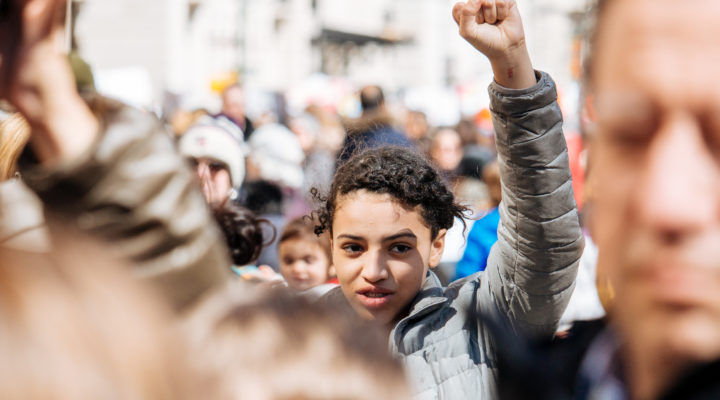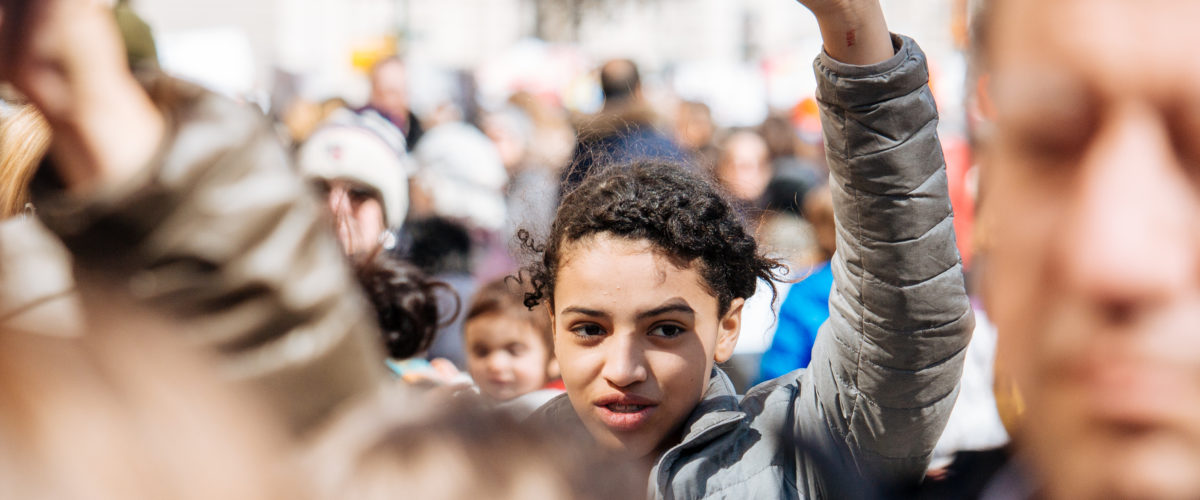The diversity and scope of Saturday’s March for Our Lives was as surprising as it was inspiring, say many of the youth involved in the protests against gun violence in American schools that were held in Washington and around the nation.
“There were just blocks and blocks of people,” said Angel Knight, 17, a member of Pullen Memorial Baptist Church in Raleigh, N.C. Seeing that kind of turnout made the movement real to her, she said.
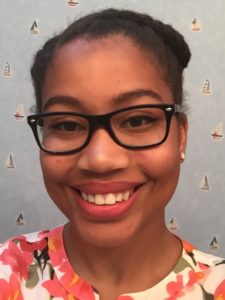
Angel Knight
Organizers said nearly 800,000 attended the march in Washington, though other estimates were just above 200,000, according to media reports. Either way, it was impressive, Knight said.
“It encouraged a lot of people.”
March for Our Lives was the latest and largest event held in response to the March 14 shootings at Stoneman Douglas High School in Parkland, Fla. The lone gunman killed 14 students and three adults. The tragedy sparked protests and school walkouts that have percolated nationally ever since.
Online, organizers announced that the coordinated marches were only one step in a fight to bring common sense to the nation’s gun policies. Speakers drove that message home Saturday.
“To the leaders, skeptics and cynics who told us to sit down, stay silent and wait your turn: Welcome to the revolution,” speaker Cameron Kasky, a Stoneman Douglas student, told the crowd in D.C., the Washington Post reported. “Either represent the people or get out. Stand for us or beware. The voters are coming.”
Knight said she was moved by the speakers and felt a surge of confidence about the vitality of the movement going forward. She was also impressed by the wide array of voices at the podium in Washington.
“One of my friends said it was surprisingly intersectional. I thought it was going to be mostly about Parkland, which is great because they have the visibility. But it was a lot about Chicago and South Central L.A. and D.C. where they have been advocating for change and gun control for 30-something years.”
Like most others gathered in Washington or at hundreds of other locations across the nation, Knight said school shootings and lax gun laws are why she participated. But it was her Christian faith that got her there.
“It gives me strength to resist because Jesus wasn’t just doing anything half-baked,” said Knight, a resident of Durham, N.C. “He did what he had to do to spread the message.”
Faith requires action
Fellow Pullen Memorial member Zoe Nichols, 16, said she, too, was struck by the diversity present at the march she attended in Raleigh.
“At a lot of marches you’ll see a lot of white people and a lot of old, white people,” she said. “At this one you had a diverse range of age and race and I saw a lot more religious groups than I normally see.”
Nichols was among the faith-motivated participants prevalent at the marches. Seeing social action modeled at her church has helped motivate her protest involvement.
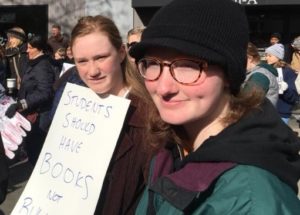
Zoe Nichols, right.
“It’s not enough to say you know God. You have to know God and put that act out into the world,” she said. She joined other members of her youth group at the Raleigh march, itself one of 800 around the nation and in some other countries.
“If I am going to call myself a Christian, then I ought to put my money where my mouth is. I feel lucky to go to a church that puts its money where its mouth is.”
Others were following suit. Baptist ministers and their congregations were posting on social media from marches in Birmingham, Ala., Richmond, Va., Jacksonville, Fla., Washington and New York, among others. Jewish, Catholic, Episcopal and other religious organizations also encouraged group participation.
‘Sometimes I’m scared’
The opportunity to march with so many people evoked a sense of safety and fellowship that helped convince 13-year-old Brooklyn resident Latoya Wilkinson to attend the New York City march.
“A lot of times kids wouldn’t have the courage to do a march either because people put them down or they don’t have enough confidence to do it,” she said.
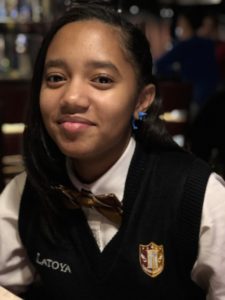
LaToya Wilkinson
The idea of marching with her youth group from Riverside Church was encouraging. But the cause was also a motivation.
“It’s exciting. I want to be an inspiration for people and I want to stand up for what I believe in.”
And, Wilkinson said, “I don’t like it when innocent people get hurt.”
Stoneman Douglas and other school shootings have seeped into her consciousness and colored her interactions with other students.
“Sometimes I’m scared to get the wrong person mad. I’m afraid if I get that person mad, they could take it too seriously and blow up the school or something.”
‘Now is the time’
Adults marched, too, and in some cases congregations participated as a group. For some of them, the March for Our Lives became an extension of ongoing efforts to fight gun violence.
“This was part of our congregational conversation,” said Russ Dean, co-pastor of Park Road Baptist Church in Charlotte, N.C.
“We’ve conversed about gun violence for a long time, but the response of the kids in Parkland has been inspiring and maybe with their loud voice we can get on board with this and have some change,” Dean said.
On Saturday, about 25 from Park Road Baptist joined with 25 members of a synagogue to march from First Ward Park to Marshall Park in Charlotte.
The youth leading the movement are setting an example for older generations, Dean said.
“Now is the time to take action as a nation.”
‘We are horrified’
Some of the youthful marchers arrived with solid experience in protest organization, in many cases developed since the Stoneman Douglas massacre.
Nichols said she has helped organize some of the walkouts at her downtown high school and was a speaker at one of the rallies earlier this month.
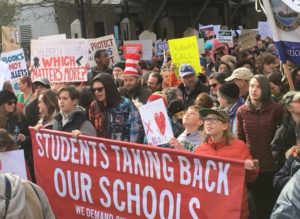
March for Our Lives participants in Raleigh, N.C. (Photo/Zoe Nichols)
But it’s fear, not social ambition, that drives her continued involvement in the movement.
“I felt afraid in school” after Parkland, especially because she has a friend in South Florida who once attended Stoneman Douglas.
“It’s given me a perspective on how necessary it is to stand up and say something. This one brought me to action the most because it’s a school in the South.”
She knows a lot of other people who, like her, also are appalled at the attacks gun-rights advocates and others are making against the youth movement. Those include claims young protesters are paid by the gun control advocates or that students are seizing the moment to simply skip school.
“We are horrified about how things are going,” she said.

